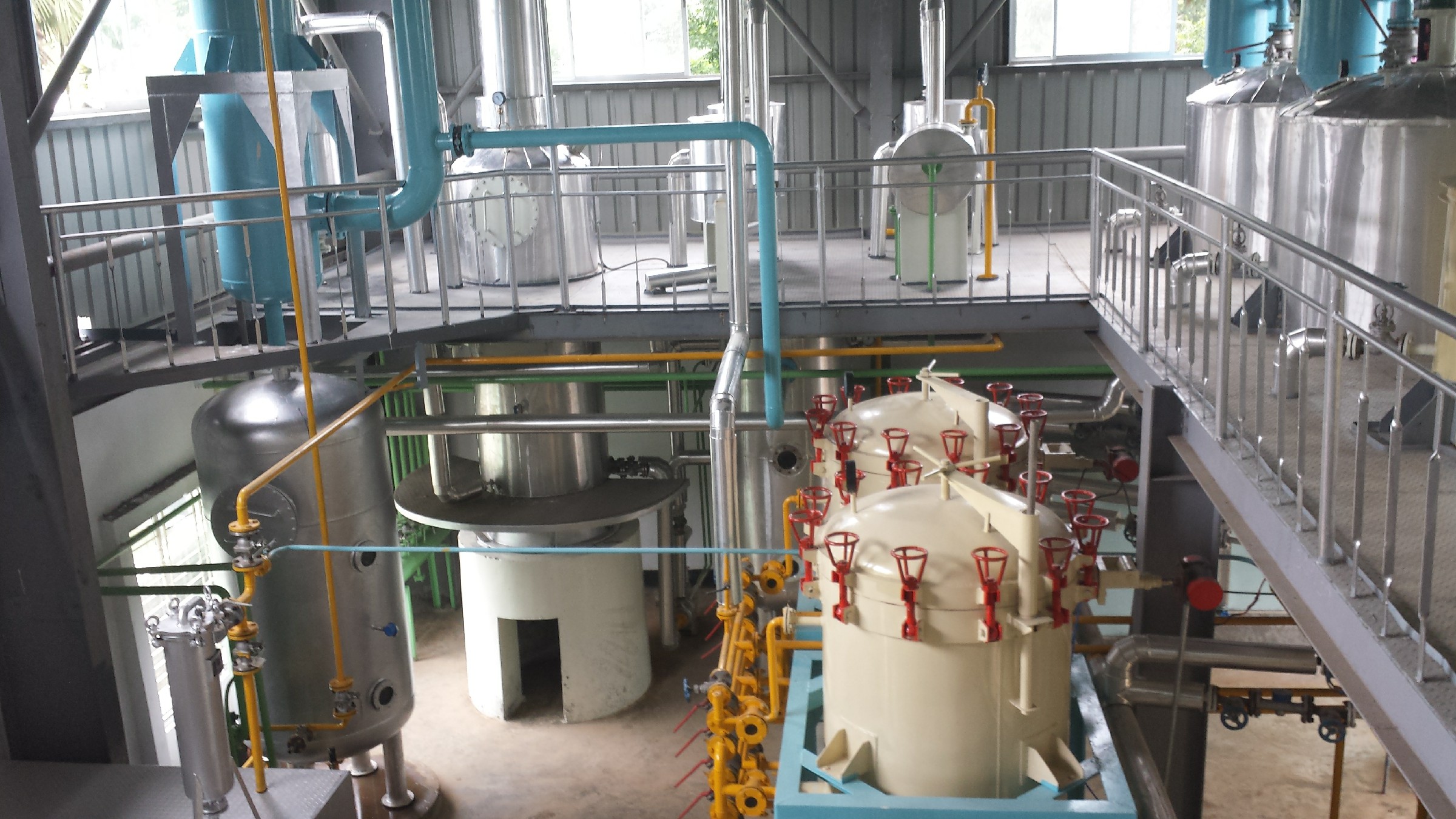A soybean oil refinery machine is used to purify and refine crude soybean oil extracted from soybeans, removing impurities such as free fatty acids, phospholipids, pigments, and other undesirable elements. The refining process results in high-quality, edible soybean oil suitable for cooking, baking, frying, and other food products. Refining also ensures that the oil has a longer shelf life, better taste, and improved color and clarity.
Soybean oil refinery machines can vary in capacity and complexity, from small batch systems to large, continuous refinery plants, depending on production requirements.
 Types of Soybean Oil Refinery Machines
Types of Soybean Oil Refinery Machines1. Batch Refining System:
- Suitable for small-scale operations, batch refining involves processing oil in batches rather than continuously. It is ideal for small producers or startups with lower processing capacities.
- Capacity: Typically ranges from 1 to 30 tons per day.
2. Semi-Continuous Refining System:
- A combination of batch and continuous processes. It offers more efficiency than batch systems and is suitable for medium-sized operations.
- Capacity: Typically ranges from 30 to 50 tons per day.
3. Continuous Refining System:
- Designed for large-scale operations, continuous refining systems operate nonstop, processing oil at high capacities. These systems are fully automated, providing efficiency and consistency.
- Capacity: Ranges from 50 to over 1,000 tons per day.
Advantages of a Soybean Oil Refinery Machine
1. High Oil Quality:
Refining improves the color, taste, and clarity of the oil, producing high-quality edible oil.
2. Longer Shelf Life:
Removing impurities and volatile compounds extends the shelf life of the oil, preventing it from becoming rancid.
3. Flexible Production:
Refinery machines are designed to handle different types of crude oils, not just soybean oil, allowing versatility in oil processing.
4. Automated and Efficient:
Modern soybean oil refinery machines can be fully automated, reducing manual labor and increasing production efficiency.
5. Reduced Waste:
Refining processes recover by-products such as soapstock and phospholipids, which can be used in other industries, such as biodiesel production or animal feed.
6. Cost-Effective:
With high oil recovery rates and the ability to produce market-ready products, the refinery process maximizes profitability.
Applications of a Soybean Oil Refinery Machine
1. Edible Oil Production:
The primary application is the production of refined soybean oil used for cooking, frying, and food processing.
2. Industrial Uses:
Refined soybean oil can be used in non-food industries such as biodiesel production, cosmetics, soaps, and lubricants.
3. Biodiesel:
Crude soybean oil can be refined and used as a feedstock for biodiesel, a renewable energy source.
4. Pharmaceutical and Cosmetic Products:
Refined soybean oil is sometimes used as a carrier oil in pharmaceuticals, cosmetics, and personal care products.
Considerations for Choosing a Soybean Oil Refinery Machine
1. Capacity Requirements:
Choose a refinery machine based on your daily processing needs. Batch systems are ideal for smaller capacities, while continuous systems are more efficient for large-scale operations.
2. Automation Level:
Fully automated machines require less labor and produce consistent results. However, they are more expensive. For smaller operations, semi-automated systems can offer a balance of cost and efficiency.
3. Type of Crude Oil:
If you are refining multiple types of oil (not just soybean oil), ensure the machine is versatile and capable of handling other crude oils such as palm, sunflower, or canola oil.
4. Investment Cost:
The price of a refinery machine depends on its capacity, automation, and configuration. Consider the total cost, including installation, operation, and maintenance.
5. Energy Consumption:
Refinery processes can be energy-intensive. Ensure the machine has energy-saving features and a proper heat recovery system to reduce operational costs.
A
soybean oil refinery machine is an essential piece of equipment for producing high-quality refined soybean oil. It ensures that the oil meets food industry standards and consumer preferences for taste, clarity, and stability. Whether for small-scale operations or large industrial plants, choosing the right type of refinery machine based on production needs, capacity, and automation is crucial for maximizing profitability and product quality.





.jpg?x-oss-process=image/resize,m_fill,h_300,w_300/format,webp)








.png)


